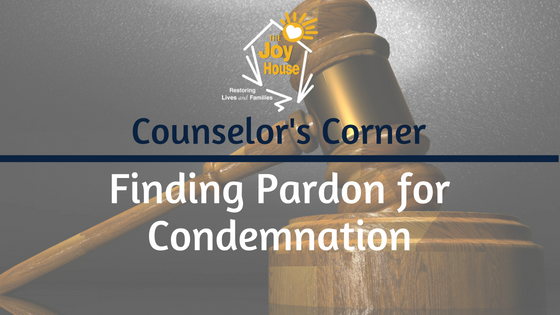Finding Pardon for Condemnation
 By: Garry Barber, PhD & Abby Elam, BSW
By: Garry Barber, PhD & Abby Elam, BSW
CONDEMNED! What a terrible, frightening, unsettling word. The whole idea of being denounced as the guilty party and sentenced to punishment with no hope of escape may leave one feeling like the death row inmate in an old movie desperately prayed for a last-minute call from the governor to grant a merciful stay of execution. A mere fraction of the population will ever be condemned to die for crimes committed yet, the desperate, overwhelming feeling of condemnation is as common to human beings as are the experiences of love, happiness, and peace.
The day to day variety of condemnation does not involve a judge or jury but usually does involve the sense of being deemed worthless and hopeless. This experience is more like a condemned property than a death row inmate. A person living in condemnation may feel isolated and rejected like the creepy old house down the street with shutters hanging sideways, a few broken windows, weeds high in the yard, no signs of life, no sounds of laughter, no visible indications of value or purpose. The person wrestling with condemnation may feel as though a sign has been hung around their neck with the words “KEEP OUT – CONDEMNED – UNSAFE” written in big bold letters.
The shame that leads to a sense of condemnation may come from many sources. Some are outside sources like hurtful gossip, unkind words, personal rejection, or public scandal. Internal sources of condemnation often have more to do with unhealthy thinking processes that allow ideas of worthlessness and shame to swirl around in one’s thoughts. Such thoughts, based upon the lies that people tell themselves about themselves, take hold and grow into a web of doubts concerning value and purpose. At the deepest level these doubts grip the human soul and wring out any sense of self-worth. Thus, self-condemnation is the pervading sense of declaring oneself worthless beyond redemption and guilty beyond pardon.
What are people to do in the face of such a painful experience of the heart? In order to push past self-condemnation a person must reach beyond self while seeking to live in the reality that this is the human condition and being broken is not unique to any one person.
Many people experience the external kind of condemnation at various points in life and invariably internalize those messages into self-condemnation (i.e. “They say I’m worthless, it must be so.”) Such condemnation comes through peers, teachers, neighbors, or parents. Worst of all is the kind of condemnation that can be imposed upon someone by their religious community. Much too often the catalyst for self-condemnation in a person’s life is judgmental rejection by those who are in fact, called to restore others with “a spirit of gentleness” (Galatians 6:1).
Church life is a powerful, important experience. People all over the world can testify to having their firmest foundations for life laid among the people of the church. However, those same churches can be a source of condemnation when grace is traded for legalism. Condemnation imposed by one’s religious community, once internalized, is difficult to shake. The logic goes something like: “If my church says I’m worthless, God must think I’m worthless … and He’s never wrong!”. As a result, people often have difficulty reaching beyond themselves into the reality of God’s grace.
This “reaching beyond self” is vital to escaping self-condemnation. To look within one’s own heart to find relief results in disappointment and frustration. How can relief be found within a heart so injured by the world and so filled with unhealthy self-evaluation? Self-condemnation is abated when one looks past the heart and acknowledges God as the sole source of our relief. The Apostle John wrote, “whenever our heart condemns us, God is greater than our heart, and he knows everything” (1 John 3:20). So, remembering that God is greater than the thoughts and imaginations of the human heart and that his mercy and grace remain constant (even though he knows the good, the bad, and the ugly of us all) is the first part of the answer to self-condemnation.
Living in self-condemnation without relief is also like living with a long-term illness but not taking the medicine to help with the symptoms. Truth is the necessary medication we need when suffering from condemnation’s debilitating effects. As stated, the first truth is that we can look beyond self to God who is greater than our hearts. The second necessary truth for escape from condemnation may be expressed something like, “I am a human being. I can’t be more or less than that. Human beings struggle with self-condemnation. Therefore, my struggle, which seems so unique to me is in fact the same kind of struggle all of humanity must face.” Even the great Apostle Paul expressed words of self-condemnation. He wrote, “Wretched man I am! Who will deliver me from this body of death?” (Romans 7:24) He was able to finally conclude “There is therefore now no condemnation for those who are in Christ Jesus” (Romans 8:1).
So, to you our fellow strugglers we say look beyond self and live in truth. As you find relief from self-condemnation in these ways we hope you can share this message of hope with fellow strugglers who seek the pardon and freedom available to all who will receive it.
Garry Barber is a Licensed Clinical Pastoral Counselor (NCCA) who holds Masters and Doctoral degrees in both biblical studies and family counseling. For nearly 3 decades he has sought to guide individuals and families to a healthier, more functional life. Abby Elam is our Counseling Center Assistant. She has a bachelor’s degree in Social Work from Middle Tennessee State University and has spent the last several years working for different nonprofit organizations and ministries.The Joy House Counseling Center exists for the purpose of providing a faith-based option for residents of the Highway 575/ 515 corridor who seek guidance with life’s problems. We have locations in Pickens, Gilmer and Cherokee Counties with fees based on income and ability to pay. We offer counseling to all ages, from 7 to 70, with professional services to a wide variety of individuals, families and their needs. Contact our Counseling Center via phone at 678-452-2037 for more information.

